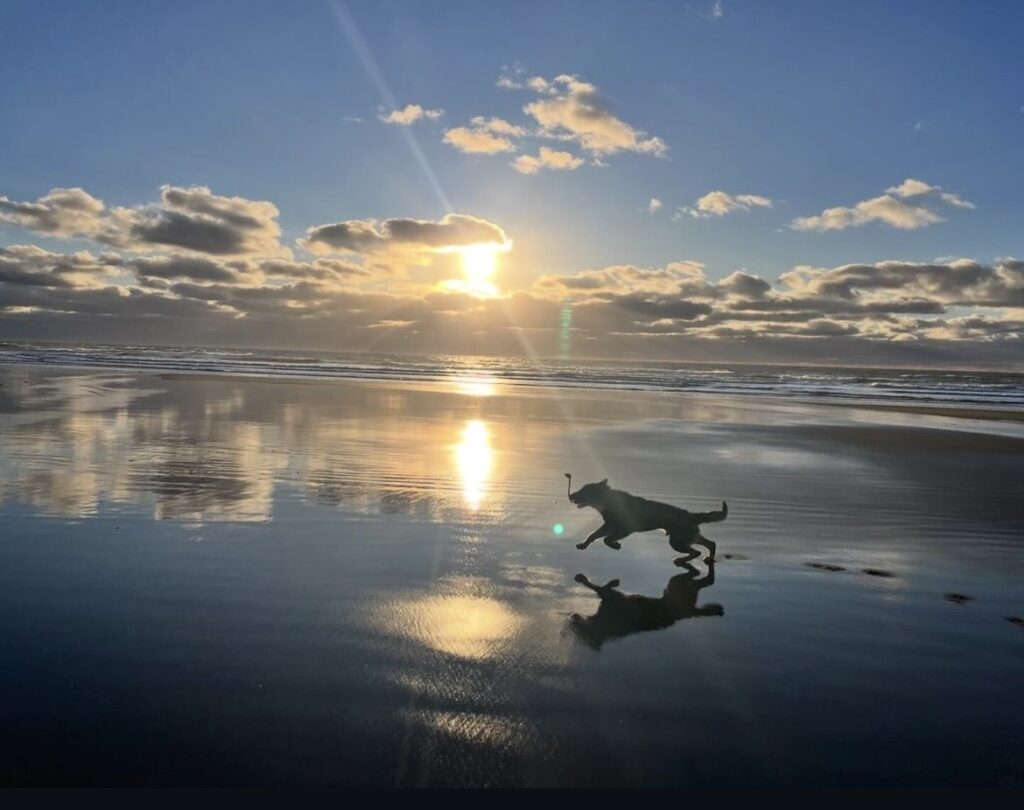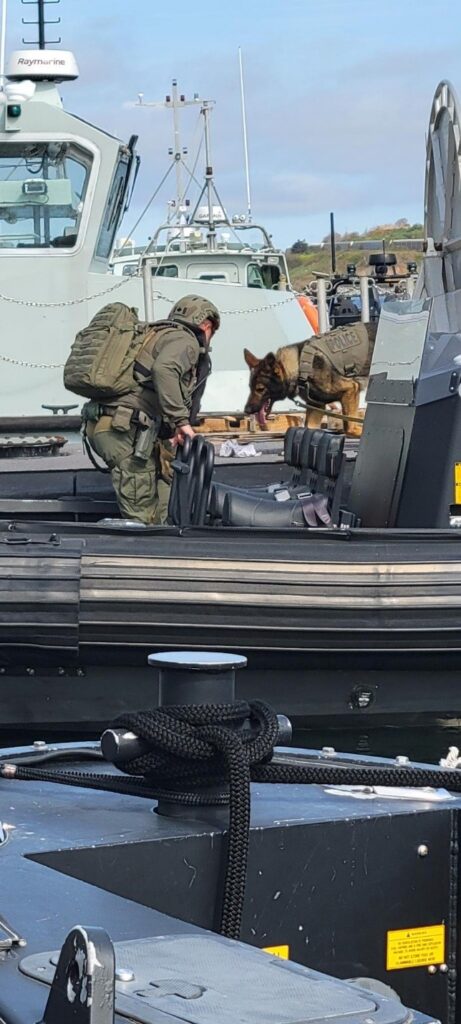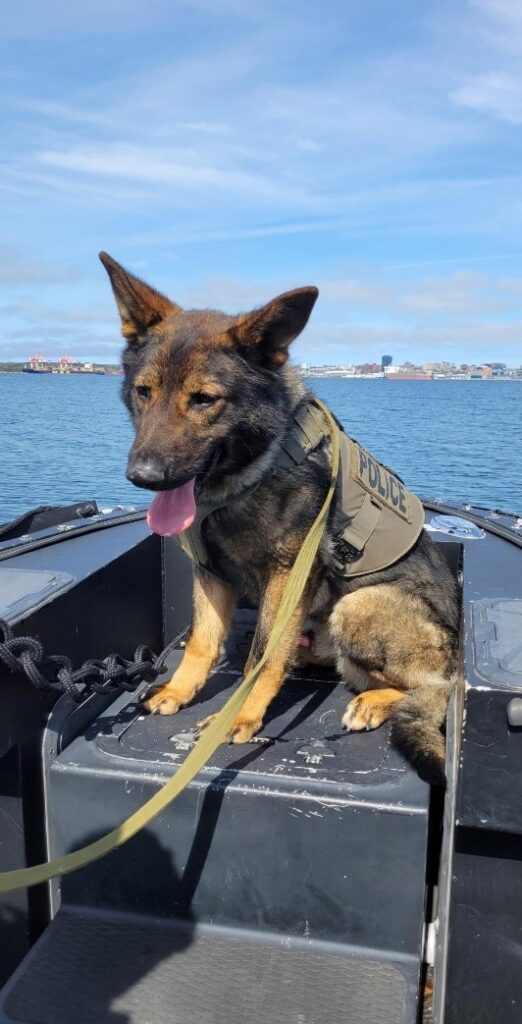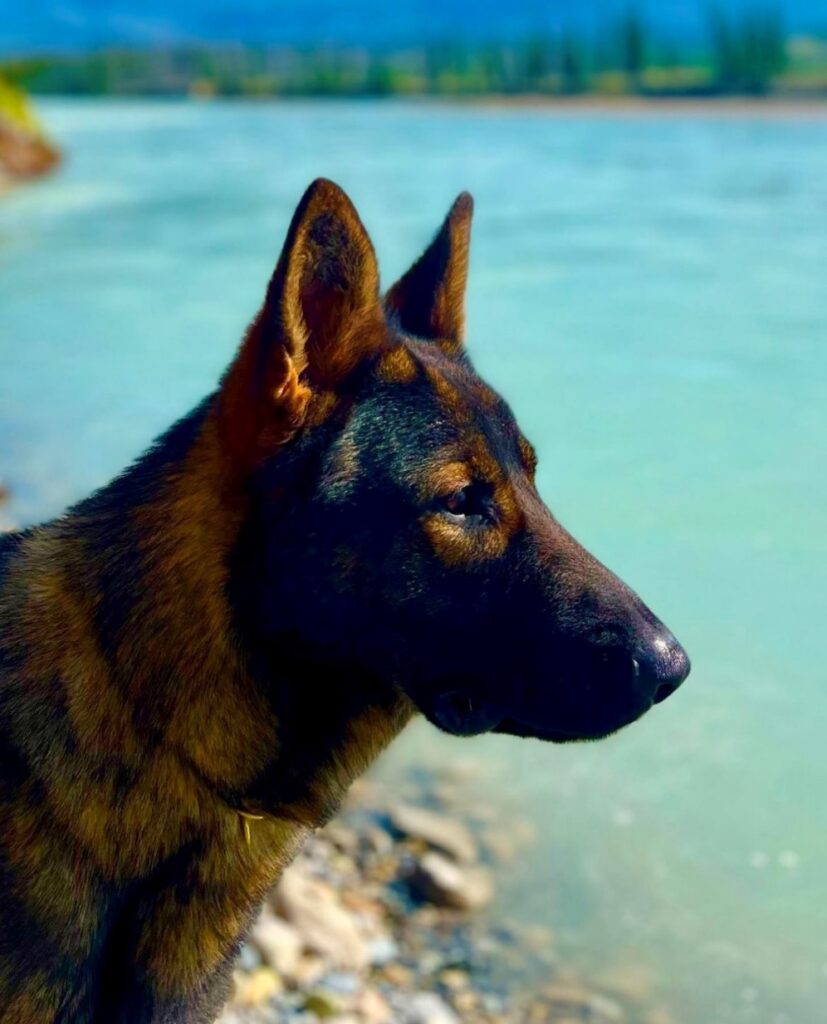In the picturesque landscape of Nova Scotia, Cpl. Hubert (Hue) Martin’s journey with the RCMP has been filled with passion, perseverance, and a deep connection to his canine companions and community.

PSD Rico at the beach, just 5 minutes from Hue‘s home, at the end of a busy shift
From Dieppe to Depot to Yarmouth, Nova Scotia
Hue’s adventure started in Dieppe, New Brunswick, where a childhood dream of becoming an RCMP officer took shape. After initially applying to the RCMP in 1999 while studying at Lakehead University in Thunder Bay, he moved back to Moncton and worked with Ambulance NB, answering 911 calls for EHS. It was there, in 2002, that he received the news he had been selected to attend Depot, the RCMP’s training academy. With hard work and dedication, he officially joined the service at the age of 26.
“I always wanted to be a Mountie,” he recalls, reflecting on his childhood aspirations.
Yarmouth, Nova Scotia, became his first home with the RCMP, and it was here that his heart was set on a unique and highly specialized role within the RCMP: becoming a Police Dog Services handler. From the very start, Hue knew he wanted to work alongside these incredible animals, and he eagerly embraced the challenge of raising and training puppies.
The Journey to Becoming a Police Dog Handler: Raising the Next Generation
Becoming a police dog handler is no quick or easy path—it typically takes 5 to 7 years from start to finish, involving dedication, patience, and a genuine love for working with animals. The journey begins when a Member expresses interest by joining local handlers during training days, where they serve as “quarries.” As quarries, Members lay tracks and take bites (wearing safety gear of course), providing valuable exposure for police dogs in different situations. This could include hiding in large buildings or even in the back of a bus to ensure the dogs are trained in diverse environments.
Once a Member demonstrates their proficiency with police dogs, they move on to the next stage: the puppy rearing course at the Police Dog Services Training Centre in Innisfail, Alberta. PDSTC. This week-long course teaches Members how to develop and socialize with 8-week-old puppies, setting the foundation for their future police work. After completing this course, Members receive a puppy to raise and, at this point, they become “imprinters.”
Typically, an imprinter will raise a puppy until it is around 12 months old. During this time, the puppy is tested at various stages to ensure its suitability for police work. Once it’s about a year old, the puppy is sent back to PDSTC’s pre-training section, where it undergoes further development. By the time the dog is between 18 and 24 months old, if it still meets stringent criteria, it is ready to be placed into specialized police dog training. But for the imprinter, the process doesn’t end there. After sending the 12-month-old puppy back to PDSTC, they start the process all over again with a new 8-week-old puppy, continuing the cycle of development that is crucial to creating well-trained and effective police dogs and handlers.
Before a Member is assigned a Police Service Dog (PSD), they need to work with various dogs in early training, often with several dogs, before they go to the Police Service Dog Training Centre in Innisfail, Alberta, and are assigned their specific and permanent dog.
Hue’s first police dog was Asta, whom he received three weeks into training after his original dog was deemed unsuitable for the role. Although he didn’t raise Asta from a puppy, she became his first official partner in the field.
Over the next six to seven years, Hue continued to raise dogs while serving as a general duty RCMP Member, balancing the demands of his daily police officer work with his duties raising Asta.
His passion and commitment paid off. Hue recalls how the bond he developed with Asta made their partnership successful. After Asta was old enough to begin her service, Hue and Asta tackled various challenges, including their first major assignment during the 2010 Vancouver Olympics, where Asta specialized in explosives detection.
Trials and Triumphs
Being a dog handler can also come with a unique set of challenges. You have to persevere, even in the toughest conditions. Tracking a suspect through Canada’s winter weather and vast wilderness can be hard, both physically and mentally. It’s a lot of time away from loved ones and colleagues, often working alone with only your canine companion through dense brush in cold temperatures to find your target – who may be a missing child or senior, or a wanted suspect.

Rico and Hue participating in ERT Marine OPS training last summer in Halifax
When faced with setbacks, including a difficult transition with a new dog named Fana, he learned valuable lessons.
“Female dogs can take longer to train,” he explains, highlighting the intricacies of canine behavior and training.
Despite the difficulties, Hubert’s determination never wavered. In 2017, after Fana went back to the RCMP police dog services training facility, commonly known as “kennels” for additional training, Hue found himself without a PSD and at a crossroads. He returned to general duty in Moncton before moving back to Yarmouth in 2018.
It was a rollercoaster journey, but it ultimately led him back to the role he cherished most.
Returning to His First Love
After serving as a Board Director with the National Police Federation, he was presented with the opportunity to return to dog handling in 2022. His excitement was palpable as he re-entered this vital role, now with a new partner—Rico.

Rico participating in ERT Marine OPS training last summer in Halifax
“I missed dog handling,” he admits.
Rico, a lively two-year-old, brought fresh energy to their partnership, but the training process was demanding.
Hue emphasizes the importance of establishing a strong bond with Rico, noting that trust is essential in their line of work.
“Police dogs are asked to do not normal things,” he explains. “They have to trust their handlers completely.”
A Day in the Life
A typical day for partners Hue and Rico is anything but ordinary. Each day can bring a new challenge, or a new operation to assist with. From drug searches to obedience training, every moment is a chance to deepen their bond and enhance their skills.
Hue recalls, “You never know what the day will bring. Yesterday, we were called out for a home invasion with armed suspects.”

Rico in Alberta while they were in training in the fall of 2023
During his training, Rico had quite a memorable experience. He accidentally swallowed what was believed to be a Kong, which led to necessary surgery. As you can imagine, Rico wasn’t exactly thrilled with the situation! What he actually swallowed was a rubber ball, which he had deflated by chomping down on it before swallowing it whole. The ball was used as a reward during his training to detect various drug scents at PDSTC. Despite the major surgery, Rico bounced back quickly—he was back to searching just 7 days later and resumed full training another week after that. Dogs will be dogs, regardless of their job.

During Rico’s recovery—the first photo while he was under anesthesia and the other after he woke up with strict instructions that no one else could interact with him other than Cpl. Martin.
Despite the unpredictability, Hue and Rico thrive in this environment. His love for the outdoors and his adventurous spirit makes being a dog handler a perfect fit.
“Most dog handlers are adrenaline junkies,” he says with a grin, recalling the thrill of tracking down missing persons or apprehending suspects.
Looking Ahead
As Hue looks to the future, he remains committed to his role within the RCMP and to his partnership with Rico. With aspirations to continue evolving as a dog handler, he aims to further integrate the use of police dogs in tactical settings, highlighting their critical role in high-risk situations.
“Dogs are becoming more essential in various scenarios,” Hubert notes, emphasizing the importance of support and training for both handlers and their canine partners.

Rico at an integrated RCMP and Halifax Regional Police ERT scenario
His experience has shown him that a well-trained dog can be an invaluable asset in law enforcement.
Hue’s story inspires us all to pursue our passions and embrace the challenges along the way, proving that sometimes, the most rewarding journeys are the ones we take alongside our four-legged friends.


